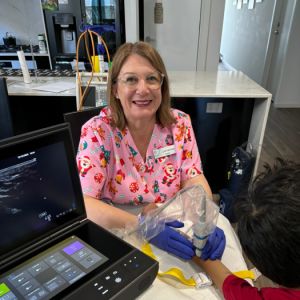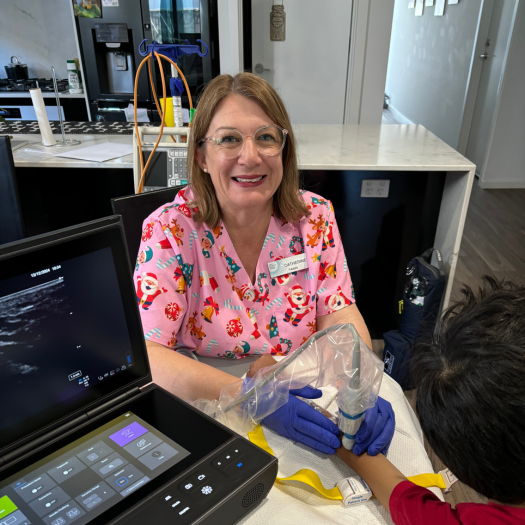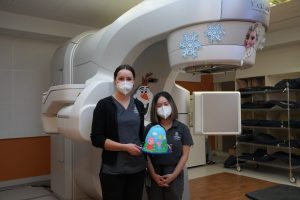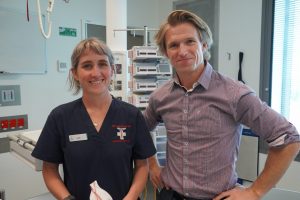Ask ten children if they like needles, and you’ll likely get ten emphatic ‘no’ responses. But what about when that fear of needles is more than mild anxiety but is born from the trauma of 10 – 15 unsuccessful intravenous (IV) insertion attempts at a time?
Catherine Baring is a special fairy, sometimes even in a tutu and tiara. Well, actually she is a FAAIRI, a Fast Access and Advice for Intravenous Routes with Imaging nurse with specific expertise to help those children with difficult intra-venous access (DIVA).
The FAAIRI service is a collaboration between the Central Adelaide Local Health Network’s (CALHN) South Australia Medical Imaging (SAMI) and the Women’s and Children’s Health Network (WCHN) and is specifically for those children who have known or predicted DIVA*.
“We created this service in response to the profound psychological distress for both children and parents when IV insertions take multiple attempts,” says Catherine, Paediatric Vascular Access Nurse Consultant.
“Not only is the distress a concern for us: failed IV attempts delay essential medications and fluids, increase the risk of infection, and can result in sub-optimal treatment. All of these impact on the patient journey and the broader hospital.”
“Instead of the general odds of inserting the IV in one attempt happening for children only half of the time (whole population), our trained FAAIRI nurses use ultrasound guidance to insert IVs with one attempt in those diagnosed with difficult vein access an incredible 98% of the time.”

Catherine Baring is a FAAIRI, a Fast Access and Advice for Intravenous Routes with Imaging nurse.
“That one attempt becomes the lived experience of our patients and their families instead of the associated trauma and needle-phobia that builds with multiple IV insertion attempts.”
“This takes a lot of training, and the SAMI FAAIRI service, with the support of the Women’s and Children’s Innovation and Research Initiatives Fund, is currently delivering ultrasound guidance training for WCHN nurses in PED (Paediatric Emergency Department), PICU (Paediatric Intensive Care Unit, Medical Day Unit, WCH@Home, and Oncology, to name a few.”
“It’s intense training, imagine holding the ultrasound probe, in your non-dominant hand, and inserting the needle, with your dominant hand, in a moving child where the vein may be only 1mm wide and up to half a centimetre deep.”
“It’s a bit like patting your head and rubbing your stomach at the same time.”
A recent collaborative qualitative research project about children’s and families’ experience of having DIVA by CALHN’s SAMI, University of South Australia, WCHN and Children’s Health Queensland Hospital provides evidence of the value of a service like this.
“What we know from the research is that it is about preparation and interaction, the clinical practice AND the communication. Parents have told us that they think it is important that clinicians reflect on their own attitudes towards power in healthcare and focus on their interactions with the children and parents before the procedure to build rapport and trust to reduce stress,” says Catherine.
“Our FAAIRI nurses are trained to check-in with the children throughout the procedure because the evidence showed that children may not vocalise pain and often found it difficult to ask them to stop the procedure.”
By embracing the evidence, reflecting on clinical practice, and putting compassion at the centre, the FAAIRI service is making one of the most common procedures in paediatrics safer and far less traumatic.
“We are the first paediatric unit in Australia with a service like this, and we have been recognised with SA Health and Australian Council on Healthcare Standards awards amongst others. It’s nation-leading,” Catherine proudly shares.
You can learn more about the FAAIRI service on the WCH website.
*while many children and adults do fear needles, the FAAIRI service is for doctor-referred patients with diagnosed difficult vein access only. Those patients with diagnosed significant anxiety may also have access to additional clinical services.



